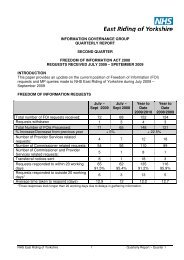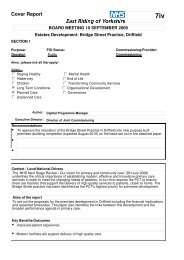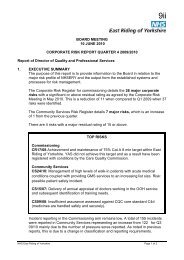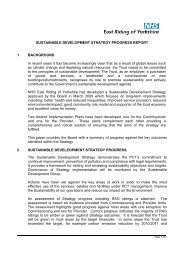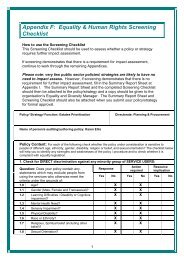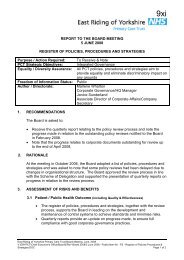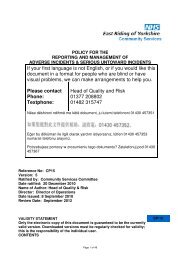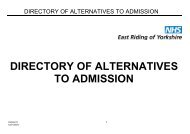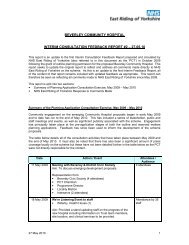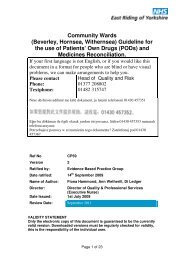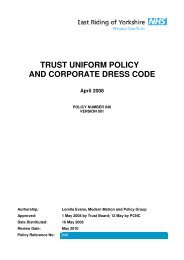Guidelines for the Management of Haematological Malignancies
Guidelines for the Management of Haematological Malignancies
Guidelines for the Management of Haematological Malignancies
You also want an ePaper? Increase the reach of your titles
YUMPU automatically turns print PDFs into web optimized ePapers that Google loves.
• in <strong>the</strong> interim <strong>for</strong> YCN, a single skin MDT should take responsibility <strong>for</strong> reviewing patients with<br />
CTCL and <strong>the</strong> Cookridge MDT will provide <strong>the</strong> lymphoma MDT review. (Referrals to be sent to<br />
Dr Di Gilson).<br />
• For Humber & Yorkshire Coast Cancer Network, <strong>the</strong> MDT meeting will be in <strong>the</strong> new<br />
Oncology/Haematology building at Castle Hill Hospital but until <strong>the</strong>n patients will be reviewed<br />
at <strong>the</strong> Hull Haematology MDT meeting.<br />
The following patients require referral <strong>for</strong> central MDT review:<br />
• Stage IA with a solitary lesion, as this may be amenable to cure with radio<strong>the</strong>rapy<br />
• Stage I B and higher at presentation<br />
• When disease is failing to respond to current treatment, <strong>for</strong> example:<br />
• disease not controlled with photo<strong>the</strong>rapy<br />
• disease is progressing through systemic <strong>the</strong>rapy<br />
• Toxicity <strong>of</strong> treatment is unacceptable, <strong>for</strong> example:<br />
• Where unacceptable doses <strong>of</strong> photo<strong>the</strong>rapy have proved necessary (>1000 J/cm 2 .)<br />
• PUVA or systemic <strong>the</strong>rapy is not being tolerated<br />
• End stage disease where no fur<strong>the</strong>r active <strong>the</strong>rapy is being <strong>of</strong>fered<br />
Treatment<br />
• The aim is to control <strong>the</strong> disease with <strong>the</strong> minimum <strong>of</strong> inconvenience and toxicity <strong>for</strong> <strong>the</strong><br />
patient, <strong>for</strong> all except trans<strong>for</strong>med disease<br />
• There are many treatment options.<br />
• Selection <strong>of</strong> appropriate treatment is based mainly on clinical stage.<br />
• O<strong>the</strong>r factors may be relevant, e.g. <strong>the</strong> patient’s age, co-morbid conditions and accessibility <strong>of</strong><br />
different treatment approaches.<br />
• Optimal treatment <strong>for</strong> each patient requires multi-disciplinary co-operation.<br />
• Referral <strong>for</strong> multi-disciplinary review should be considered.<br />
• Multi-disciplinary clinics take place Cookridge Hospital in Leeds (Dr Di Gilson) or Hull Royal<br />
Infirmary (Dr Russell Patmore).<br />
<strong>Guidelines</strong> <strong>for</strong> <strong>the</strong> <strong>Management</strong> <strong>of</strong> <strong>Haematological</strong> <strong>Malignancies</strong><br />
14. CUTANEOUS LYMPHOMA<br />
34



